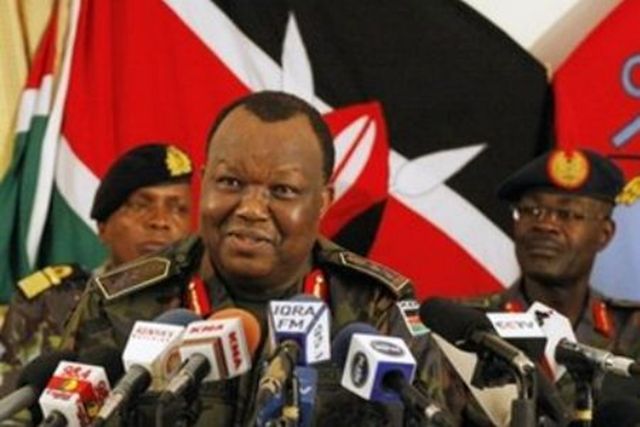
Somalia’s Neighbors Making Progress against al-Shabaab Despite Threats of Retaliation
Publication: Terrorism Monitor Volume: 10 Issue: 7
By:

Under military pressure from its neighbors on several fronts, Somalia’s al-Shabaab/al-Qaeda Islamist militants are beginning to show fractures in the solidarity of their leadership after losing several key towns and regions. As the movement faces the worst situation it has experienced in several years, it has resorted to threats against civilians in Kenya, whose forces are fighting al-Shabaab in southern Somalia: “The Kenyan public must be aware that the more Kenyan troops continue to persecute innocent Muslims of Somalia, the less secure Kenyan cities will be; and the more oppression the Muslims of Somalia feel, the more constricted Kenyan life will be. Such is the law of retribution. Your security depends on our security. It is a long, protracted war and Kenyans must neither harbor a reason for optimism nor hope for triumph. ” [1]
In the latest developments, Ethiopian forces supporting the pro-government militia Ahlu Sunna wa’l-Jama’a (ASWJ) captured Elbur, a strategic stronghold of al-Shabaab in Galgudud Province, about 225 miles north of Mogadishu (Shabelle Media Network, March 26; Raxanreeb.com March 26). Only days earlier, the movement had also lost Hudur Town in Bakool region to Ethiopian forces (Jowhar.com, March 22). In response, al-Shabaab spokesman Shaykh Ali Mahmud Raage (a.k.a. Ali Dheere) held a press conference via telephone and read a statement by the top leadership of al-Shabaab that accused the United States, Israel and NATO of pushing Somalia’s neighbors to occupy the country. The statement also appealed to the mujahideen to unite against the foreign troops (Shabelle Media Network, March 26; Somalimemo.net, March 26). The appeal did little to stem the tide, however, and by March 30 AMISOM was reporting that Ugandan and Burundian forces working with Somali troops had retaken the important Dayniile District northwest of Mogadishu, thus relieving al-Shabaab of one of their most important strongholds (AFP, March 30). The Islamists had earlier lost their military base at Maslah, their last base in Mogadishu. Al-Shabaab used this base to carry out executions and other punishments of persons they identified as infidels or spies. It was also a base for al-Shabaab leaders to hold public rallies to promote their ideology and for the public viewing of jihadist tapes and videos (Radio Muqdisho.net, March 2; Kismaayonews.com, March 2).
These latest military pressures have forced al-Shabaab to change its methods and revert to hit-and run tactics. The group attacked an Ethiopian base at Yurkud in the southwestern Gedo region in mid-March, claiming to have killed 74 Ethiopian soldiers and injured more than 100 (HSMPress [al-Shabaab’s official Twitter account], March 13, al-Kataib Media, March 11). However, Somali authorities claimed to have killed 130 of the attackers in the same battle with minimal loss to Ethiopian or Somali government forces (al-Jazeera, March 10). In another incident the radical Islamists attacked a military post near Baidoa in Bay region (al-Kataib Media, March 24).
The commander of the Kenyan Defense Forces (KDF), General Julius Karangi, has declared that Kenyan troops will join forces from Uganda, Burundi and Djibouti in the African Union Mission in Somalia (AMISOM) (Hiiraan Online, March 13). Possibly in reaction to al-Shabaab’s deteriorating situation in the south, the movement has replaced its local administrator in the Jubaland district, Shaykh Abubakr Ali of central Somalia’s Hiiraan region, with Abdurahman Hudeyfi, who is from Afmadow in Lower Juba Province (Hiiraan Online, March 13).
Kenya’s government has accused al-Shabaab of being behind a grenade attack at a bus station in Nairobi that left six Kenyans dead and 63 others injured (Daily Nation [Nairobi], March 10; March11). While al-Shabaab has several times warned the Kenyan government of the consequences if it refused to withdraw its troops from Somalia it has denied any involvement in that incident (Bar Kulan Radio, October 19, 2011; Halgan.net, March 12; HSMPress, March 12).
Al-Shabaab leaders insist that they will fight until the death of the last member of the group or the establishment of the Islamic state. They have described their retreat as a “military tactic” rather than a defeat, claiming that they have already carried out many attacks on the enemy since falling back (Jowhar.com, March 2; March 6). Abu Abdirahman, al-Shabaab’s regional leader in Banaadir, claimed victory against Somali Transitional Federal Government (TFG) and AMISOM forces, saying that their militants prevented these forces from advancing towards the outskirts of Mogadishu. [2]
Al-Shabaab has started to force elders from Bay region to take part in the war against Ethiopian armies and TFG forces in Baidoa. The group also wants the elders to bring young men of their clans to participate in the war and has begun arming students for the same purpose (Shabelle Media Network, February 7; Mareeg.com, March 7).
The major challenge for Kenyan and Ethiopian forces in the liberated areas remains to ensure the stabilization of these areas and to secure them from al-Shabaab sleeper cells and hit-and-run attacks. Kenyan military spokesman Major Emmanuel Chirchir says that the strategy remains to reduce al-Shabaab’s effectiveness and restore TFG authority. [3] The movement continues to target Ethiopian forces with land mines and car bombs in the two key cities held by Ethiopian forces, Baidoa and Beledweyn (Hiiraan Online, January 24; February 23; Bar Kulan Radio, March 2; Raxanreeb Online, March 2).
The military forces of Somalia’s neighbors still have a long way to go to accomplish their objectives of defeating and eliminating al-Shabaab as a regional threat. Large parts of southern and central Somalia remain in the hands of al-Shabaab, including the key port city of Kismayo, the financial cornerstone of the movement. The veteran militants of the movement, newly united with al-Qaeda, continue to enjoy the support of some clan groups who see the foreign forces as favoring particular clans and political movements that want to increase their influence in the regions held by al-Shabaab.
Abdullahi Ahmed Mohamed is the Nairobi, Kenya-based editor of Nabadnews.com and regional representative of Kismaayonews.com.
Notes:
1. Press Office, Harakat al-Shabaab al-Mujahideen, April 1, 2012.
2. Press conference held by al-Shabaab’s Bandir region administrator, Abu Abdirahman, in the Dayniile District, March 6, 2012.
4. Kenya’s Military spokesman Facebook status update, October 31, 2011.





